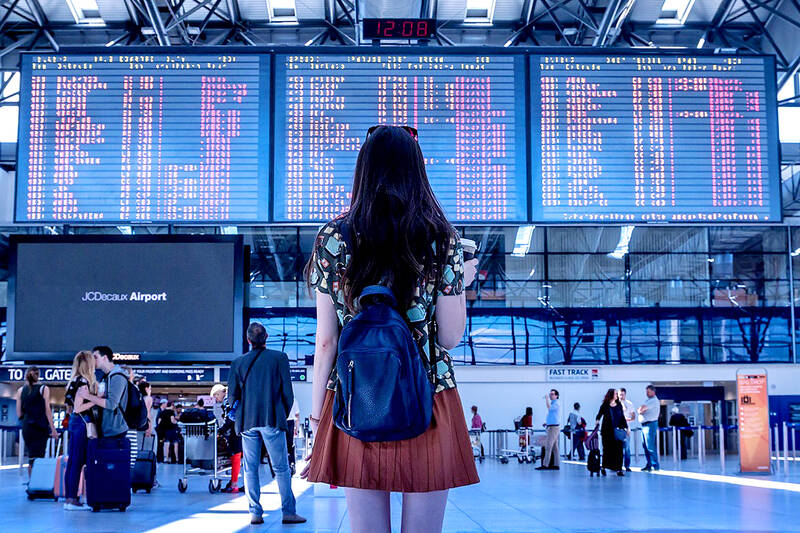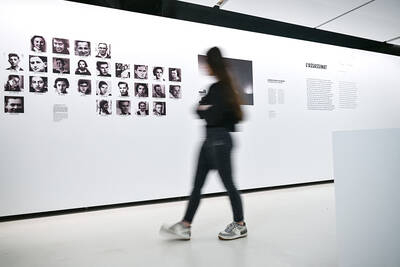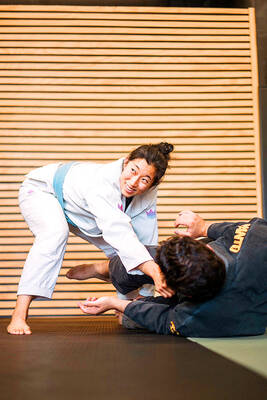出國前的手續
隨著各國開放入境,商務出差的機會也大大提升,而出國的第一步就是要先到機場(airport),每個機場還有分成不同的航廈(terminal),因此務必要在出發前先確認航廈,避免因時間延誤導致搭不上飛機。
I arrived at the airport two hours before my flight to make sure I had enough time to check in and go through security.

Photo courtesy of Pixabay / 照片:Pixabay提供
(我在航班起飛前兩個小時到達機場,以確保我有足夠的時間辦理登機手續並通過安檢。)
After passing through security, I made my way to the terminal, where I would be catching my flight to New York City.
(在通過安檢之後,我前往我的航廈以搭乘前往紐約市的班機。)
準備登機
在機場報到(check-in)完成後,旅客會拿到登機證(boarding pass),上面記載著航班號碼(flight number)、登機口(boarding gate)等資訊。
過完安檢後可以逛逛免稅店(duty-free)並等候登機,而頭等艙、商務艙、或是有特殊需求的乘客可以優先登機(pre-board)。
I went to the wrong boarding gate, and had to run to the correct one just in time to catch my flight.
(我走錯了登機口,要即時跑到對的才能搭上飛機。)
The boarding gate for my flight was announced over the airport intercom, so I gathered my belongings and headed to the designated area.
(我的航班登機口已通過機場廣播公告了,所以我收拾好了行李並前往指定區域。)
出入境與行李限制
出境(departure)與入境(arrival)的後方搭配大廳(hall)或大門(gate),就是departure hall「出境大廳」與arrival hall「入境大廳」,兩處都要經過安檢(security)。
I made sure to arrive at the departure hall at least 30 minutes before my flight to allow time for boarding.
(我確保至少在航班起飛前三十分鐘抵達出境大廳,以便有時間登機。)
商務人士在出差(go on a business trip)時通常不會帶太多行李(baggage/luggage),要特別注意的是這個單字為不可數名詞,量詞要搭配a piece of(件)。
而各航空針對旅客攜帶行李都有不同限制,但通常可以帶一件手持行李(carry-on),並規定尺寸要能放置於頭頂置物櫃(overhead bin/compartment)內,下飛機後要去行李提領處(baggage claim)領回自己的行李。
After arriving at the airport, I headed to the baggage claim area to retrieve my suitcase.
(在抵達機場後,我前往行李提領區域取回我的行李箱。)
I carefully placed my carry-on bag in the overhead compartment after finding my seat on the plane.
(在找到我的飛機座位之後,我小心翼翼地將手提行李放在上方的置物櫃中。)
直飛、直達?
航班有許多種類,例如direct flight「直飛航班」、non-stop flight「直達航班」,兩者差異在於direct flight在抵達目的地之前,通常會停留一個至多個轉機點,讓部分乘客下機或轉機。non-stop flight則是同一航班一路坐到目的地,中途不會有轉機、下機加油等問題,但直達航班的價格往往是較昂貴,因為最省時也最適合商務客。
深夜起飛的red-eye flight「紅眼班機」,通常早上會抵達目的地,因為晚上睡不好,所以眼睛會泛紅,因此稱為紅眼班機。最後,connecting flight「轉機航班」,因為是連結出發地與目的地的班機,所以用connecting稱呼。因為轉機造成在機場處的等待,則稱為layover「(飛行途中的)短暫停留」。
I had a long layover in Chicago before my flight to Los Angeles, so I decided to explore the airport and grab a bite.
(我飛往洛杉磯前在芝加哥有個很長的候機時間,所以決定要去探索一下機場,並吃點東西。)
The layover for my connecting flight was only 45 minutes, so I had to hurry to make it to the next gate on time.
(我中途轉機的時間僅有四十五分鐘,所以要匆忙準時趕往下一個登機口。)
【TOEIC 模擬試題】
1. I can’t believe I left my passport in the _______ claim area at the airport. I hope it’s still there when I get back.
(A) baggage (B) check-in (C) security (D) departures
2. I had to put my luggage in the overhead _______ on the train because there was no room in the seats.
(A) compartment (B) platform (C) station (D) route
【解析】
1. 正解為(A)。題意為「我不敢相信我把護照遺失在行李提領區,希望我回來時它還在那裡。」雖然(B)報到,(C)安檢,(D)出境,三個選項都跟機場有關,但因為空格後方是claim「認領」,只能選baggage「行李」,故(A)為正解。
2. 正解為(A)。題意為「在火車上,我需要把行李放在頭上的置物櫃中,因為座位上沒有空間了。」(B)月台,(C)車站,(D)路線,overhead compartment「座位上方行李置物櫃」符合句意,故(A)為正解。
SOURCE: https://www.englishok.com.tw/toeic/toeic-issue/airport-english
文章由TOEIC Program Taiwan · Chun Shin提供:
www.facebook.com/ToeicProgramTaiwan

Historians are rethinking the way the Holocaust is being presented in museums as the world marks the 80th anniversary of the liberation of the last Nazi concentration camps this month. Shocking images of the mass killings of Jews were “used massively at the end of World War II to show the violence of the Nazis,” historian Tal Bruttmann, a specialist on the Holocaust, told AFP. But in doing so “we kind of lost sight of the fact that is not normal to show” such graphic scenes of mass murder, of people being humiliated and dehumanized, he said. Up to this

A: Brazilian jiu-jitsu, known as “BJJ,” has become more and more popular. Even Hollywood stars like Halle Berry and Tom Hardy are obsessed with it. B: Some Asian stars, such as Taiwanese actor Eddie Peng and South Korean actor Lee Joon-gi, have also practiced this martial art. A: BJJ is not just a martial art, but also a combat sport. B: I’ve always wanted to try it, but I’m worried about getting injured. A: Diana Wang, a US doctor of physical therapy, is holding a BJJ seminar at PMA Brazilian Jiu-jitsu in Taipei Friday night. Let’s go check out how we

When people listen to music today, they typically use streaming services like YouTube or Spotify. However, traditional formats like vinyl records have regained popularity in recent times. Vinyl records are circular discs that store music in grooves on their surfaces and are played on a turntable. As the turntable’s needle runs along these grooves, it picks up vibrations and translates them into sound. The history of vinyl records dates back to the late 1800s, but material and technological challenges delayed mass production until the 1950s. Despite early versions having short playtimes and poor sound quality, vinyl records introduced a new era

A: Actually, Brazilian jiu-jitsu is particularly good for small people like you. B: Really? How so? A: According to Diana Wang, a US doctor of physical therapy, the BJJ’s purpose is to help smaller, weaker people defend themselves by using various techniques, such as leverage. B: That sounds interesting. What time does Dr Wang’s BJJ seminar begin tonight? A: The event is scheduled for 7:30pm at PMA Brazilian Jiu-jitsu in Taipei. Admission is free, but donations are welcome. A: 其實你的個子比較小,很適合練巴西柔術呢。 B: 真的嗎?為什麼? A: 據美國理療醫師王幼瑞博士說,巴西柔術的概念是讓弱小的人,也能利用槓桿作用等技巧防身。 B: 真有趣,王醫師的巴柔研討會幾點開始? A: 今晚7點半在「台北巴柔運動館」,免費入場自由樂捐唷! (By Eddy Chang, Taipei Times/台北時報張迪)